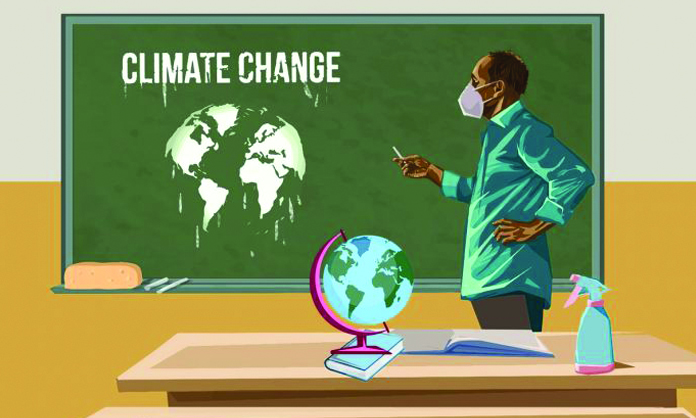All young people need to have access to high-quality climate education because emotional engagement with the climate crisis can motivate action.
We recently surveyed more than 2 400 pupils aged 11 to 14 in England about their views on climate change and sustainability education. Pupils from disadvantaged backgrounds were less likely to experience negative emotions related to climate change.
Children from more advantaged backgrounds were more likely to want to learn about climate change and sustainability, to do more to look after the environment and to believe that adults are doing enough to look after the planet.
The variation in climate literacy and educational opportunities demonstrated through our survey is highly concerning.
These inequalities are particularly concerning as children from disadvantaged backgrounds are more vulnerable to the effects of climate change.
But these children’s limited capacity to engage with climate issues is also understandable, considering the state of child poverty in the United Kingdom and the more immediate challenges they are probably facing.
MENTAL HEALTH
Much has been written about young people’s fears about the climate crisis and the associated mental health effects.
We know far less about how to introduce these challenging topics to children who are less engaged.
How can we reach these young people so they’re not isolated or sent into a panic, but empowered to act?
Our research suggests that schools are a critical place to start.
In our survey, pupils of all socio-economic backgrounds told us they learned about climate change and sustainability in secondary school.
Conversely, children from disadvantaged backgrounds were less likely to have learned about these topics in the news and media, from their families and from extracurricular activities.
These findings are somewhat unsurprising given the algorithms limiting engagement with online content that challenges our existing perspectives.
Children from disadvantaged backgrounds also experience many barriers to participating in nature-based activities outside school. These include lack of availability, cultural exclusion and safety concerns.
A CHANCE FOR CHANGE
Based on our survey and earlier research (for example, the pioneering work of psychology professor Maria Ojala), we have identified three ways in which schools can address inequalities to reach and connect with all children to deliver quality climate and sustainability education.
First, the education sector should include climate and sustainability learning within a broader range of subjects. Climate change intersects with nearly all aspects of our lives. Therefore, all school subjects offer unique learning opportunities.
If climate and sustainability education was integrated throughout the formal and informal curriculum, children could learn about the issues as part of the subjects that most interest them.
For example, our colleagues at University College London are developing a new type of crafting activity in schools.
It involves combining materials from nature and paper circuits which bring nature to life through light. Through integrating nature, technology and art, these hybrid nature crafts align with many subjects and could appeal to children of all ages.
We must also develop emotionally responsive teaching practices. Building climate awareness is emotionally challenging, particularly for children with little prior knowledge of the issues. It can also be emotionally draining for teachers.
EMOTIONAL REFLECTION
Time for emotional reflection should be included in lesson plans. Pupils should be encouraged to share their emotions, be it sadness, anxiety or anger. These are valid and natural responses when learning about climate change.
Creative practices can encourage emotional engagement with climate learning. For example, arts-based activities and storytelling. Our research found that students felt happier with their lives, spent more time outdoors and were more optimistic about the future after taking part in arts-in-nature experiences.
Schools should also give pupils opportunities to combat the climate crisis and other environmental issues. This supports their sense of agency, which is critical to motivating action. Engaging students in collective action can be particularly effective for empowering them and instilling hope.
Rachael Edwards is a senior research fellow in public health at the University College London (UCL). Grace Healy is a honorary associate professor of climate education at UCL, and Nicla Walshe is a professor of education at UCL.
– The Conversation
Stay informed with The Namibian – your source for credible journalism. Get in-depth reporting and opinions for
only N$85 a month. Invest in journalism, invest in democracy –
Subscribe Now!







